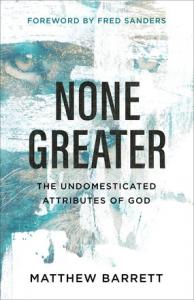In an age when Jesus is our buddy and personal friend, the Holy Spirit is a gentle and understanding still small voice within, and God is is an understanding justice of the peace who would never let anything but love win; Matthew Barrett’s book None Greater: The Undomesticated Attributes of God is an essential reminder that the Triune God is infinitely greater than any other being in creation.
None Greater is a short systematic theology of the attributes of God that are infinitely above us and tied directly to his perfection as Creator. These attributes include:
- incomprehensibility
- infinitude
- aseity
- simplicity
- immutability
- impassibility
- timelessness
- omnipresence
- omnipotence
- omniscience
- omnisapience
- righteousness
- goodness
- loving
- glorious

These might be intimidating terms, but this book is not written for professional theologians. Instead, it is intended to help the average church member dig into the depths of God’s divinity and so develop our worship so that it reflects the all mighty God of Scripture, rather than the watered-down God of contemporary Evangelical culture. This book attempts to answer the question:
“What must be true of God if he is the most perfect being?” (10)
In answering, Barrett draws on the heavyweights of church history (with a special emphasis on Augustine, Anselm, and Aquinas) in order to explain how much greater God is than us, and why that sense of ultimate perfection should fuel our worship. Again, this is not a dense theological textbook. There are books that go into more depth and more detail, but this book is accessible without being casual or compromising Biblical truth and is a readable length without sacrificing theological robustness.
As an example of what None Greater explores, why does it matter that God is immutable–that is, why does it matter that his emotional state is unaffected by forces outside of himself? Isn’t that just another way of saying he doesn’t care about us? If God really cared about us, wouldn’t he be sad when bad things happen to us and glad when we obey him?
You’ll have to read the book for the whole answer, but the short version is that if God can be changed–even in his emotions–by circumstances, then he cannot be perfect.
“If he were to change for the better, that would imply that he was less than perfect beforehand… If he were to change for the worse, that would imply that he was perfect but not longer is perfect… In either option, God ceases to be eternally good.” (95)
Even more importantly, a God who can change should be terrifying to those who claim to rely on his promises for salvation. On the other hand, if God is immutable:
“the Christian has every reason to flee to God for refuge in an hour of great trial. And this side of the empty tomb, the soul’s ‘sure and steadfast anchor’ is found in no one else but Jesus, the Christ, the one who is ‘the same yesterday and today and forever’ (Heb. 13:8).”
Because God is immutable, we can trust that he will keep all his promises. And one of his promises is the promise that he will save those who believe in Christ.
And that’s just one example. The whole book is worth reading by yourself or with a group of people from church in order to humbly explore the nature and character of our great God.
Highly recommended.
Dr. Coyle Neal is co-host of the City of Man Podcast and an Associate Professor of Political Science at Southwest Baptist University in Bolivar, MO












